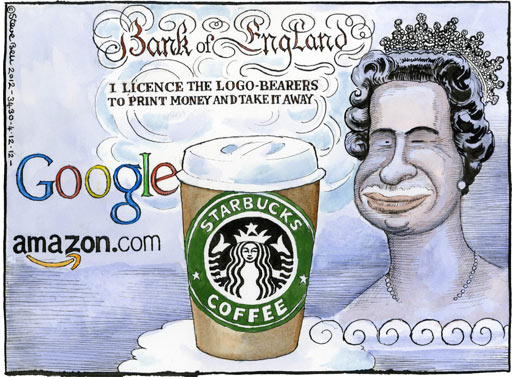 I have just raised my head from the words of Yasmin
Alibhai-Brown and her column on ‘the rich,’ only for my gaze to be met by a ream
of anti-corruption stories, one after the other on my twitter feed. I just
cannot get away from the theme of the 1%, ‘the despotic rich taking us 99% for
all we have got.’ You have heard the Owen Jones rhetorical speeches many a
time. But I suppose since the breaking of the HMRC story, regarding their
policy on waiving penalties for late submission, I just can’t help but feel
like this story has been lumped in with all the others. Nick Hanauer the self-proclaimed
‘zillionaire plutocrat’ suggested that the pitchforks are coming. I don’t see
them. It just sounds romantic
I have just raised my head from the words of Yasmin
Alibhai-Brown and her column on ‘the rich,’ only for my gaze to be met by a ream
of anti-corruption stories, one after the other on my twitter feed. I just
cannot get away from the theme of the 1%, ‘the despotic rich taking us 99% for
all we have got.’ You have heard the Owen Jones rhetorical speeches many a
time. But I suppose since the breaking of the HMRC story, regarding their
policy on waiving penalties for late submission, I just can’t help but feel
like this story has been lumped in with all the others. Nick Hanauer the self-proclaimed
‘zillionaire plutocrat’ suggested that the pitchforks are coming. I don’t see
them. It just sounds romantic
Her Majesty’s Revenue and Customs it was revealed last week,
has been waiving the £100 automatic penalty it imposes on those who submit
their self-assessment tax returns late. HMRC stated that it wanted to focus it’s
energy on more significant tax evasion and would only waive this £100 fine
where there was a ‘reasonable excuse.’ In the assessment of what constituted ‘reasonableness,’
the leaked HMRC memo which caused all the furore stated that, the penalty
regime must be, ‘cost effective, fair and proportionate.’ The Memo went on to
state that, HMRC’s current policy of implementing the penalties did not adhere
to these criteria in many cases and therefore a change was in order.
Over the last few days I have heard many a broadcaster
attempt to incite his/her guest into suggesting somehow that this policy
panders to tax dodgers. The waiving of a £100 penalty subject to a reasonable
excuse, must disproportionately benefit those with less to declare surely. In
fact, the the Low Incomes Tax Reform Group as published in the FT, has
suggested that many compliant taxpayers have been caused, “a very significant
amount of distress and worry,” from the enforcement of such penalties. This has
been an especially acute problem in terms of ‘proportionality,’ a criteria for
enforcement. Many late submissions made during the last tax year subject to a
penalty, were for far less than the amount of the penalty itself and according
to the HMRC’s own figures, more than 200,000 people submitted late last year
because they simply failed to click ‘submit’ online, which is considered as a ‘reasonable
excuse’ by the HMRC definition. Penalties in cases such as these are only
contested by those with adequate representation or by those that have financial
advice.
This is just a view but I feel that the HMRC memo story has
been delivered to the public in much the same vein as the amass of other recent
financial corruption stories. The subtext to each broadcast being, ‘hear ye
hear ye, see here lowly common folk how the big organisations of our time avoid
their societal responsibility, whilst all you lot foot the bill.’ I’m not sure
it’s that simple and in this instance it seems to me that HMRC’s decision to
waive the £100 penalty on late submissions of self-assessment tax returns, can
only aide the UK’s tax raising ability. This is especially so when considering
the further departmental cuts that will certainly hit. Concentrating resources
on large scale tax evasion/avoidance is just good sense as well as being more
equitable.
This is not to say of course that there is no credence in
the 99% v the 1% narrative perpetuated by our media outlets. Indeed HMRC itself
has on prior occasion been caught on the wrong side of the argument. In 2011 it
was reported that Goldman Sachs had made a so called, ‘sweetheart deal,’ and
£10m in interest owed to HMRC was mysteriously dropped. Sir Gus O’Donnell who
was the then Head of the Civil Service, has been embarrassed in front of the
Public Accounts Committee on several occasions since then, most notably being
accused of presiding over, ‘illegal dealings’ between HMRC and Vodaphone. HMRC
waived a potential tax bill of 7bn, acting beyond the statutory powers offered
to them. So considering these behaviours it is easy to see why Nick Hanauer,
the ex CEO of Amazon, might say ‘the pitchforks are coming.’ But this story,
contrary to it’s repeated presentation, is more nuanced. Tax stories are not
always black or white and don’t usually make much of a story. If there is a
soul crushing organisation keeping the ‘man’ down, now that’s good copy. Who cares
if the angle is so acute it’s one dimensional.